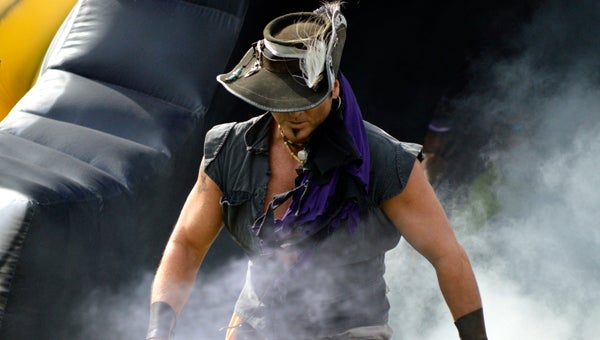COLUMN: Football not clouding justice in Greenville
Published 1:07 pm Tuesday, October 14, 2014

DAVID CUCCHIARA | DAILY NEWS
BEING A PIRATE: The reputation of the Pirates’ football program has only improved under the tenure of head coach Ruffin McNeill.
The New York Times released an investigative report on Sunday citing the school’s and the Tallahassee police department’s nepotism over the course of many years in the handling of Florida State football players’ punishments after purportedly committing various major and minor crimes.
As expected, there he was, front page of the world’s most esteemed newspaper, a picture of sophomore quarterback Jameis Winston with head coach Jimbo Fisher posing at a recent photo shoot. At just 19 years old, Winston’s Heisman-winning smile has quickly become one of the most recognizable in all of sports, but recently, its reputation has taken a hit. Even as the poster boy of the No. 2-ranked Seminoles, that smile has gone from the trademark of a champion to the expression of a potential lawbreaker, regardless of whether or not he actually did, in fact, break the law.
His place in the limelight, along with his overtly sociable personality, has unfairly deemed Winston guilty until proven innocent by the media and, depending on your college football allegiance, the fans. Despite what you may think about him, even though some of his recent actions like shouting profanities in the student union have warranted attention, until he is convicted of something, it’s unfair to assume, especially when we’re talking about a kid who is clearly several steps away from being deemed a man.
But the report also exposed a shopping list of instances with police that were pushed aside or mishandled. One was Winston’s involvement in a pellet gun incident in the fall of 2012. Police responded to a complaint that two people were “walking on a bike trail carrying ‘a long-barreled handgun.’” Winston and a teammate were handcuffed, but eventually let go, only to participate in a pellet gun shootout that caused $4,200 of damage later that night, the article states.
Acts that should have been considered a felony resulted in a $300 fine per player. And again, this past June, players were involved in another BB-gun incident that caused even more damage, according to The Times.
Yet, Winston and his BB-gun slinging comrades were on the field for Saturday’s game at Syracuse, where the Seminoles’ field general completed 83 percent of his passes for 317 yards and three passing touchdowns.
Again, since nothing ever came of any one of Winston’s significant alleged crimes, the immediate blame lies with law enforcement and the school. In the community, he is still supported by most Seminoles fans, his teammates and his coaching staff.
Things work a bit differently in Greenville, where East Carolina is off to one of the best starts in team history with a 5-1 record. Through his tenure as Pirates head coach, Ruffin McNeill has built a sort of family atmosphere, one based on a zero tolerance policy when it comes to serious offenses.
In just his second season at the helm in 2011, McNeill flexed his muscles, suspending Emanuel Davis and Michael Bowman, arguably two of the top players on the roster, for the season opener due to a citation issued by the Greenville Police Department stating the duo was publically intoxicated and disorderly. The Pirates lost that game to South Carolina, 56-37.
In 2012, it was tackle Terry Williams who was suspended for his arrest on drug charges, though, he was given a second chance, one that seemingly turned his football career around.
And in 2013, McNeill dropped the hammer on receiver Antonio Cannon (who was also suspended in 2012), barring him from all program activities for undisclosed reasons. Cannon, who had just one reception for seven yards prior to the suspension, would not play another snap for the Pirates.
Finally, this season, McNeill suspended one of his top receivers, Cam Worthy, for a “verbal disagreement” between him and another male student. And later, three freshmen players were suspended indefinitely for their role in, coincidentally, a BB-gun-related incident. While the shots caused Wahl-Coates Elementary to initiate lockdown procedure, the freshmen did not fire the pellet gun at anyone and they didn’t cause $4,200 or even $1 worth of damage. Yet, the violation broke the zero tolerance policy and the situation was handled swiftly.
Throughout McNeill’s five years as coach, no one has really complained about, challenged or negated his rulings. That’s’ because he has earned the respect of a community by adhering to not only the university’s academic standards, but also its rich football lineage — everything being a Pirate is supposed to represent.
That works into the family atmosphere that embodies the program and sets a great example for other institutions. Florida State’s administration, the Seminoles players, the Tallahassee law enforcement and, most importantly, Jameis Winston can all learn from this. Right now, the Florida State program is in the early stages of paying for years of neglecting what it means to be a Seminole. McNeill has only bolstered what it means to be a Pirate.





